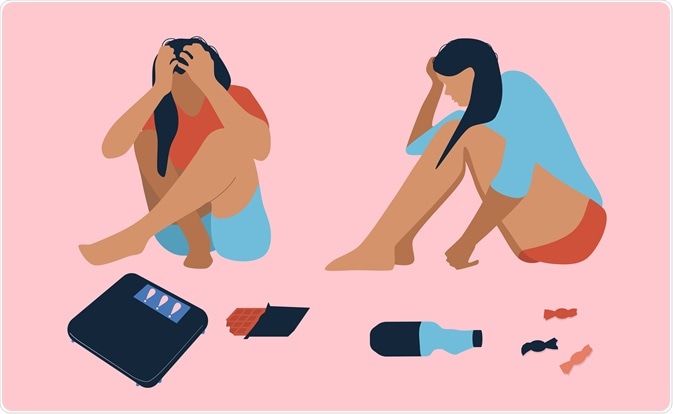Bulimia nervosa is a serious mental illness that can lead to dangerous health consequences if left untreated. Also, people who suffer from bulimia often feel ashamed and embarrassed about their condition. Moreover, this can make it difficult for them to seek help. Moreover, in this article, we will discuss the causes, symptoms, and treatment of the disorder.
What Is Bulimia Nervosa?

Bulimia nervosa is a mental health condition where someone eats a lot of food in a short period of time and then tries to get rid of the food by vomiting or using laxatives. Purging behaviors can include vomiting, using laxatives or diuretics, excessive exercise, and fasting. Also, people with the disorder may struggle with feelings of guilt, shame, and perfectionism around food and their body shape and size.
What Are The Symptoms Of Bulimia Nervosa?
The main symptom of bulimia nervosa is bingeing and purging. Other symptoms can include:
- Excessive exercise: People with bulimia nervosa may feel the need to exercise for hours a day in order to burn off the calories they consumed during their binge.
- Depression: Many people with bulimia nervosa also experience symptoms of depression, such as feeling sad or hopeless, having low energy, and having difficulty sleeping.
- Food preoccupation: People with bulimia nervosa may think about food all the time and be very focused on their weight and body shape.
- Poor self-esteem: People with bulimia nervosa often have low self-esteem and feel like they are not good enough.
- Eating very little food: Some people with the disorder will eat very little, or even skip meals, in order to try to lose weight.
- Obsessively counting calories: People with bulimia nervosa may count the number of calories in everything they eat and obsess about their diet.
- Feeling out of control around food: People with the disorder may feel like they can’t control what or how much they eat.
What Causes Bulimia Nervosa?
The cause of bulimia nervosa is not fully understood, but it is thought to be caused by a combination of genetic and environmental factors. Some possible causes include:
- Stress: People with bulimia nervosa may use bingeing and purging as a way to cope with stress or anxiety.
- Low self-esteem: The disorder often develops when someone has low self-esteem and is unhappy with their body shape and size.
- Pressure to be thin: There is often pressure from the media and society to be thin, which can lead to feelings of insecurity and body dissatisfaction.
- Traumatic experiences: Some people may develop the disorder after experiencing a traumatic event, such as sexual abuse or assault.
What Triggers Bulimia Nervosa?

There is no one answer to this question, as each person’s triggers may be different. However, some common triggers include:
- Stressful situations: Bulimia nervosa can often be triggered by stressful events or situations.
- Hormonal changes: Changes in hormones such as estrogen and progesterone can sometimes trigger bulimia nervosa symptoms.
- Seeing thin people: Some people may start bingeing and purging after seeing someone who is very thin or after reading a magazine article about being thin.
Negative Impact Of Bulimia Nervosa
The negative impacts of bulimia nervosa can be devastating both physically and emotionally. People with the disorder are at risk for a number of dangerous health consequences, including:
- Electrolyte imbalances: This can lead to irregular heartbeats, seizures, and even death.
- Dehydration: Purging can cause dehydration, which can lead to kidney failure and other serious health problems.
- Malnutrition: Bulimia nervosa can cause people to become malnourished due to not getting enough nutrients from food.
- Gastrointestinal problems: Vomiting can damage the esophagus and stomach and may lead to ulcers or pancreatitis.
- Osteoporosis: Purging can cause bones to become weak and brittle.
- Mental health problems: People with bulimia nervosa are at risk for developing anxiety, depression, and other mental health problems.
What Is The Treatment For Bulimia Nervosa?
The treatment for bulimia nervosa usually involves a combination of therapy and medication.
Therapy Options
 There are a number of different types of therapy that can be helpful for people with the disorder. Some common therapies include:
There are a number of different types of therapy that can be helpful for people with the disorder. Some common therapies include:
- Cognitive-behavioral therapy (CBT): CBT is a type of therapy that focuses on changing the thoughts and behaviors that contribute to someone’s eating disorder.
- Dialectical behavior therapy (DBT): DBT is a type of therapy that helps people learn how to manage their emotions and tolerate difficult situations.
- Interpersonal psychotherapy (IPT): IPT is a type of therapy that focuses on the relationships between people and the role they play in causing or maintaining someone’s eating disorder.
- Family-based treatment: Family-based treatment is a type of therapy where family members are involved in the treatment of their loved one’s eating disorder.
- Counseling: Counseling is a type of therapy that provides support and guidance for people with eating disorders.
Medication

There are a few different medications that may be helpful for people with bulimia nervosa, including:
- Antidepressants: Antidepressants can help to reduce symptoms of depression, which is often comorbid with bulimia nervosa.
- Anti-anxiety medications: Anti-anxiety medications can help to reduce symptoms of anxiety, which can trigger binges and purges.
- Bupropion: Bupropion is a medication that is sometimes used to treat the disorder. It helps to decrease cravings for food and increase feelings of pleasure from healthy foods.
Self Help Strategies

People with bulimia nervosa can also try to implement some self-help strategies to help them manage their disorder. Some self-help strategies include:
- Keeping a food journal: This can help you track what foods you are eating and how much you are eating.
- Avoiding dieting and restrictive behaviors: Restrictive diets can trigger binges and purges.
- Exercising regularly: Exercise can help to boost your mood and increase feelings of self-confidence.
- Getting enough sleep: Getting adequate sleep can help to improve your mood and overall well-being.
- Talking to a therapist: Talking to a therapist can provide you with support and guidance in managing your eating disorder.
How Can I Get Help For It?
If you are struggling with bulimia nervosa, it is important to seek help. There are a number of resources available to you, including:
- Your doctor: Your doctor can provide you with information about treatment options and refer you to a therapist who specializes in eating disorders.
- A therapist: Therapists who specialize in eating disorders can provide you with the support and guidance you need to manage your disorder.
- An online support group: There are a number of online support groups for people with bulimia nervosa. This can be a great way to connect with others who understand what you are going through.
Helping Someone With Bulimia Nervosa
If you know someone who is struggling with bulimia nervosa, there are a few things you can do to help them. Some helpful tips include:
- Encouraging them to seek treatment: Encouraging your loved one to seek treatment is the most important thing you can do.
- Offering emotional support: Supporting your loved one emotionally can be crucial in their recovery from the disorder.
- Helping them set realistic goals: Helping your loved ones set realistic goals can be a great way to encourage them to stick with their treatment plan.
- Providing positive reinforcement: Positive reinforcement can be an effective tool for helping someone with the disorder stay on track with their treatment plan.
- Reminding them that they are not alone: Reminding your loved ones that they are not alone can be very helpful. There is often a feeling of isolation associated with eating disorders.
Conclusion
Bulimia nervosa is a mental disorder that is characterized by binge eating and purging behaviors. Some people eat a lot of food in a short time and then they feel sick. These people might feel ashamed or embarrassed. It is not their fault. Also, purging can involve vomiting, excessive exercise, or the use of laxatives or diuretics.
Bulimia nervosa typically begins in late adolescence or early adulthood, and it affects both men and women equally. Consequently, the condition can cause health problems over time, including dehydration, kidney damage, heart problems, and tooth decay.
Also, treatment for the disorder usually involves therapy and medication. Some people also need to be hospitalized for treatment. Finally, with treatment, most people with the disorder are able to recover.
Moreover, if you or someone you know is struggling with bulimia nervosa, it is important to seek help. Furthermore, there are a number of resources available to you, including your doctor, a therapist, and online support groups.
A Word From Therapy Mantra
Your mental health — Your psychological, emotional, and social well-being — has an impact on every aspect of your life. Positive mental health essentially allows you to effectively deal with life’s everyday challenges.
At TherapyMantra, we have a team of therapists who provide affordable online therapy to assist you with issues such as depression, anxiety, stress, workplace Issues, addiction, relationship, OCD, LGBTQ, and PTSD. You can book a free therapy or download our free Android or iOS app.


